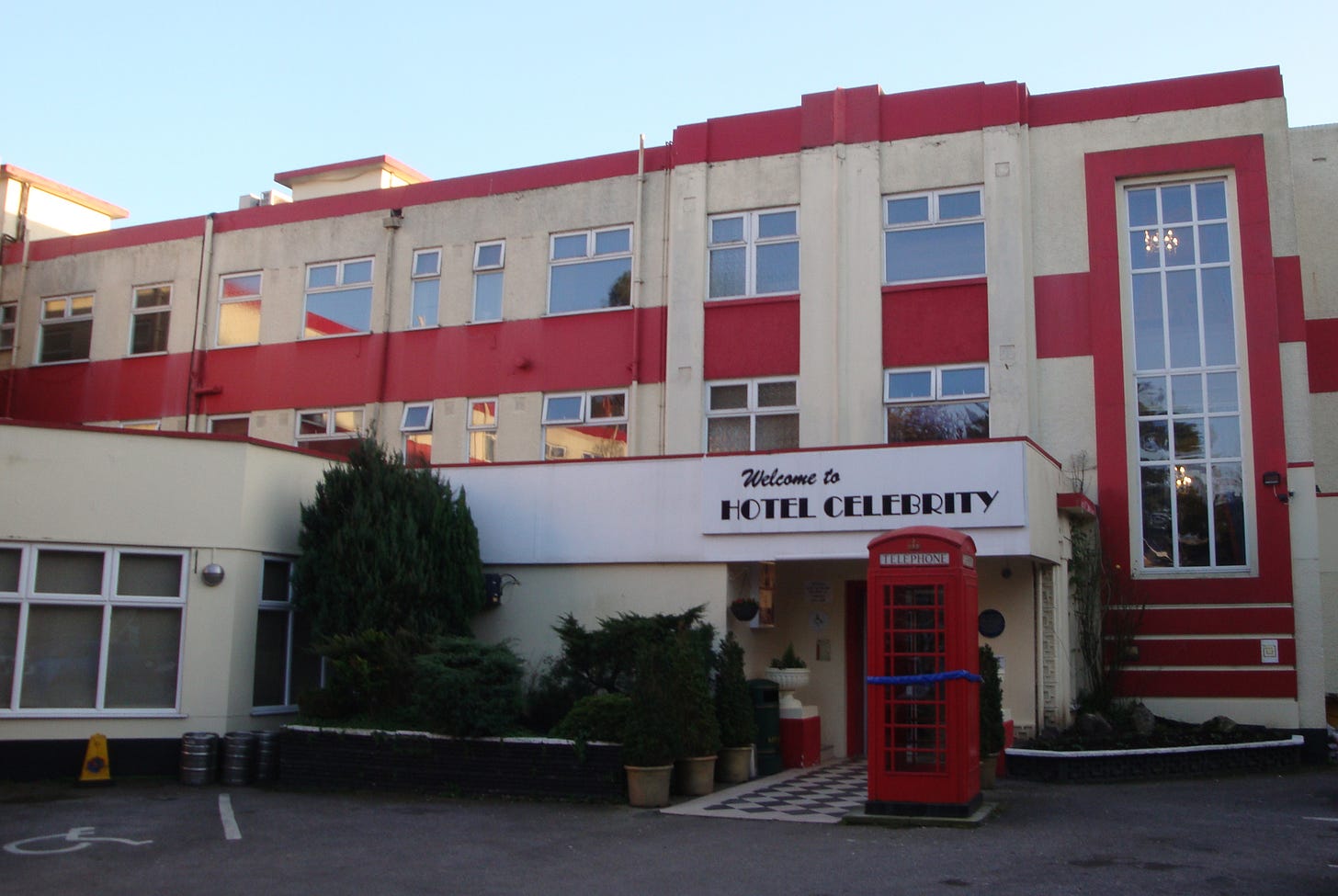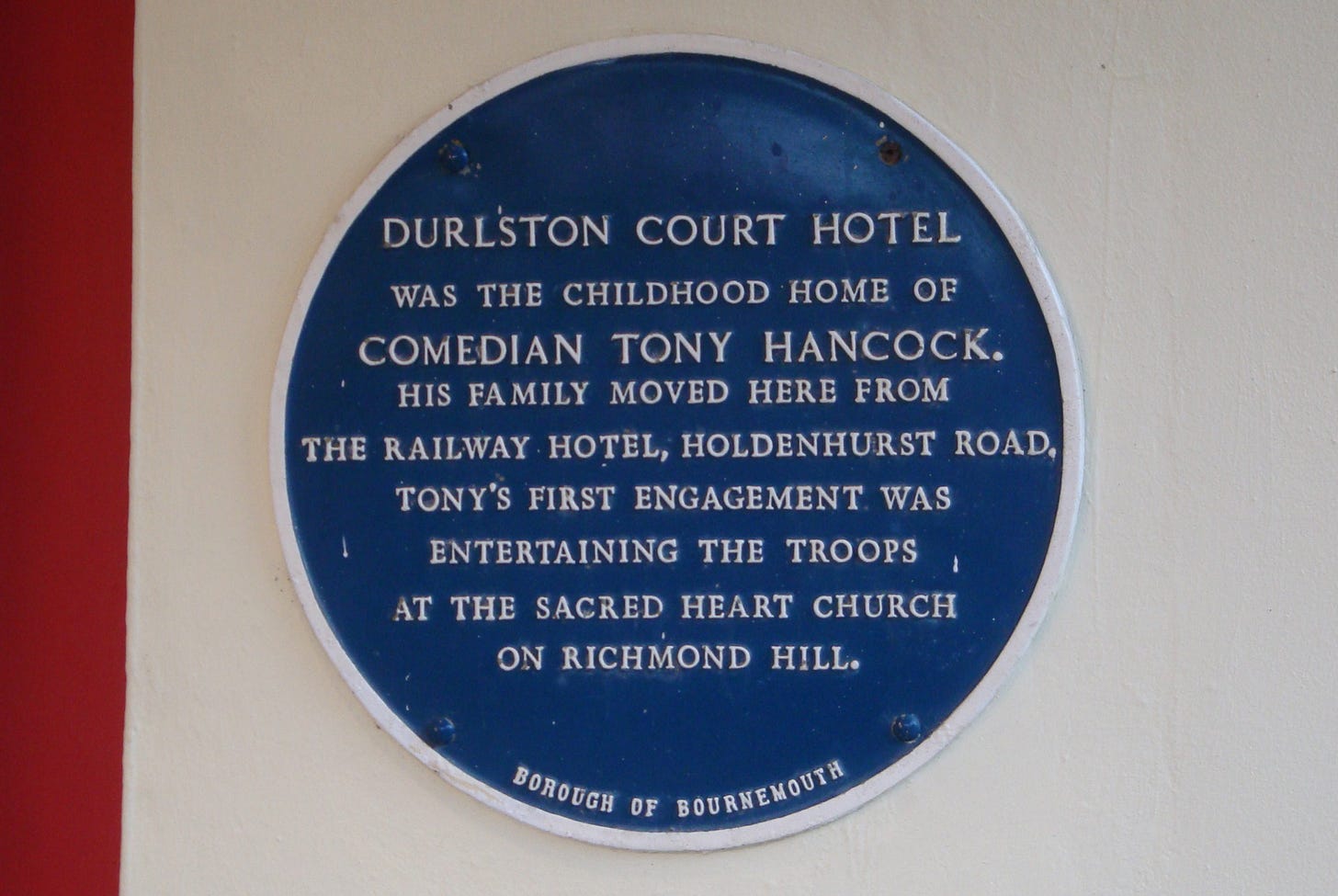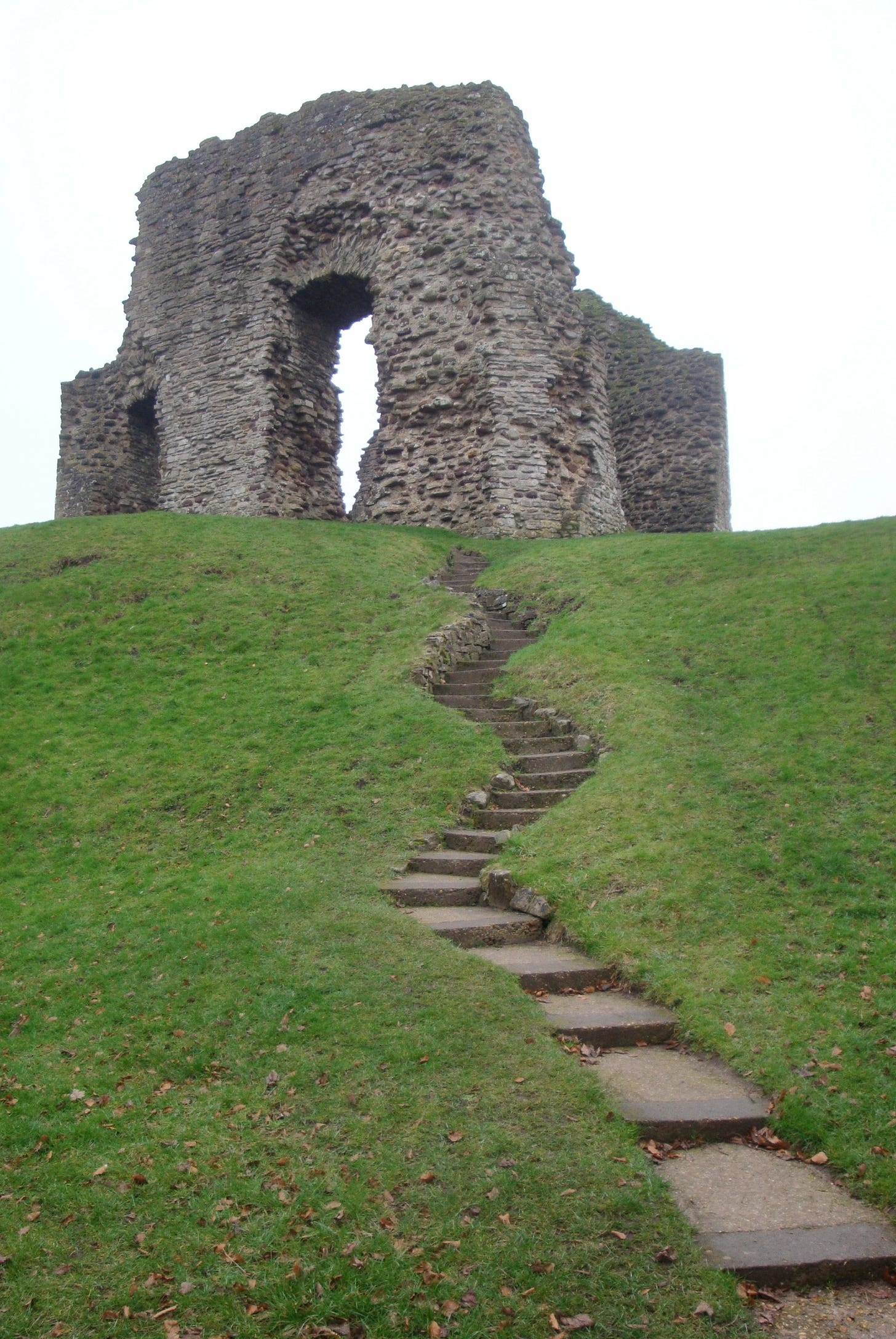Tony Hancock – who we last encountered in Cransford – spent a lot of his early life in Bournemouth hotels. Which may go some significant way to explain why he always looked so bloody morose.
His childhood homes were the Railway Hotel and the Durlston Court Hotel. The Railway Hotel is no more, as far as I can tell. Either it stood where there is now a branch of Halfords or it has disappeared under the nearby car park for a frankly ridiculously large Asda supermegaduperstore. Unfortunately I did find Durlston Court and it would have been better had it pulled a Richard III, so to speak, and disappeared under a car park. It is now called the Hotel Celebrity.
There are photographs of dozens of real celebrities in the reception of the hotel and, given that this is not the Hollywood Roosevelt, I was surprised to see images of actors like Renee Russo and Jim Carrey as well as such luminaries as Nelson Mandela. Surprised, that is, until I discovered that these were not people who had stayed here, they were simply small pictures of well-known people that the hotel also owned slightly larger pictures of.
Elvis Presley and Ken Dodd
Rooms were named after these people but they had absolutely no connection with the hotel at all. For instance, the Jim Carrey room is so called not because the Bruce Almighty star stayed there but because there is a poster of The Truman Show and a picture from Dumb and Dumber hanging over the bed. Their accessible Elvis Room is not so called because the overweight King of Rock ‘n’ Roll needed an easily accessible bathroom but because there are three posters of Elvis hanging in the bedroom. Bruce Springsteen, David Bowie and Ken Dodd all feature, none have stayed here, not even Doddy - as far as I know.
The hotel exterior today is painted cream and a sort of deep, shocking pink or, at least, it was painted that way about fifteen years before I arrived. It’s almost in the Art Deco style but it also borders on being in the post-war Eastern Bloc style and most resembles a cross between one of those chemical-filled cakes you sometimes see in railway buffets and the Museum of the Great Patriotic War in Minsk.
Outside there is an old red phone box which is secured with a hefty chain and padlock. I have a feeling that I do not want to know why. There is, however, a small display dedicated to Mr Hancock in one of the corridors. It features two posters, half a dozen pictures and three typewriters. There’s also a plaque saying that Anthony John Hancock spent many happy years there.
He moved to the hotel with his mother and step-father when he was ten and grew up there before joining the Royal Air Force at the age of eighteen. I spent some time growing up in a seaside resort before joining the RAF at the age of eighteen; so I guess I can see how Bournemouth may have featured highly in his life. If he was happy here then that certainly wasn’t an attribute reflected in his character Anthony Aloysius St John Hancock or, it has to be said, in much of his later life which was dogged by alcoholism and a failure to meet many of his own expectations.
Expectations are tricky things, they are the things which make us sad or happy and yet they are simply fantasies we’ve made up which the world has no duty to live up to. We are clearly crazy.
I don’t suppose that coming from Bournemouth was really what made Hancock miserable, in fact, as far as I can see, the very best thing about coming from Bournemouth is the fact that you are no longer in Bournemouth; that should be enough to make you smile.
Hancock was born and lived the first three years of his life in Birmingham. The Bournemouth that I have experienced shares at least one attribute with Brum: the weather. It is not always drizzly in Birmingham, sometimes it rains, and I’ve never been to Bournemouth in good weather either. I’ve been at all times of the year and I’ve never seen anyone on the beach who didn’t have their hood up.
Christchurch
I want to make it clear that my feelings about Bournemouth do not spread out into the wider county of Dorset, which I love to pieces. You don’t have to go far, Christchurch is lovely.
If you lived and worked in Bournemouth, I can see no reason why you wouldn’t move to Christchurch. Either the one in Dorset because it would still be handy for work or the one in New Zealand because it’s the other side of the bloody world from Bournemouth.
Move to Christchurch, that would be my advice. It has lovely shops, including one that sells nothing but cake and desserts, and a thatched tea rooms where you can retire having looked around the ruins of the twelfth century Norman castle. Christchurch Priory is the longest parish church in the British Isles. There are remains of a Norman house built here in 1160. It has a gorgeous harbour full of lots of little boats bobbing on the River Stour.
Travel writer Bill Bryson, when he was a journalist for the Bournemouth based Daily Echo in the 1970s, had the good sense to live in Christchurch and commute.
Stanpit Marsh sits just below the confluence of the rivers Avon and Stour. Sixty-five acres of salt marsh; creeks; salt pans; reed beds; freshwater marsh; and sandy scrub. It has been a Local Nature Reserve since 1964 and a Site of Special Scientific Interest since 1986. There have been three hundred and thirteen bird species recorded here; I didn’t even know that there were three hundred and thirteen bird species.
Hengistbury Head with its views over to The Needles on the Isle of Wight is one of the most delightful places in the entire world. Most of the rest of Dorset is equally wonderful. Just not Bournemouth.
Ethanolly-Challenged
Bournemouth is a bustling town, even out of season, but for every four people that I saw in the streets, one of them looked as though they were just minutes away from being returned to some sort of secure facility by the authorities. Many of the residents seem to have followed Tony Hancock’s life choices and are, what might the modern, politically-correct term for it be, ethanolly-challenged?
The politician, writer and sportsman George Charles Grantley FitzHardinge Berkeley visited Bournemouth about a hundred and fifty years before me and said: “At Bournemouth man has no amusement of any kind.” While we might be using a different definition of the word “amusement”, we agree. It has always seemed a sad and sombre sort of place to me. Maybe I was unlucky with the weather, maybe I never saw it at its best but it wasn’t the place for me.
Nobel Prize
The nobel prize-winning psychologist Daniel Kahneman carried out research some years ago into people’s experiences of undergoing colonoscopies. Their overall experience, no matter how bad it was or how long it lasted, was simply an average of the worst moment in the colonoscopy, and how badly it hurt when the procedure ended. To make your visit to Bournemouth only as unpleasant as having a camera stuck up your arse, you are advised to leave Bournemouth via the gardens which run like a snake through the centre of the town; they are really rather pleasant. It is best to leave with that memory of the place. But, let’s be clear here, it is best to leave.









